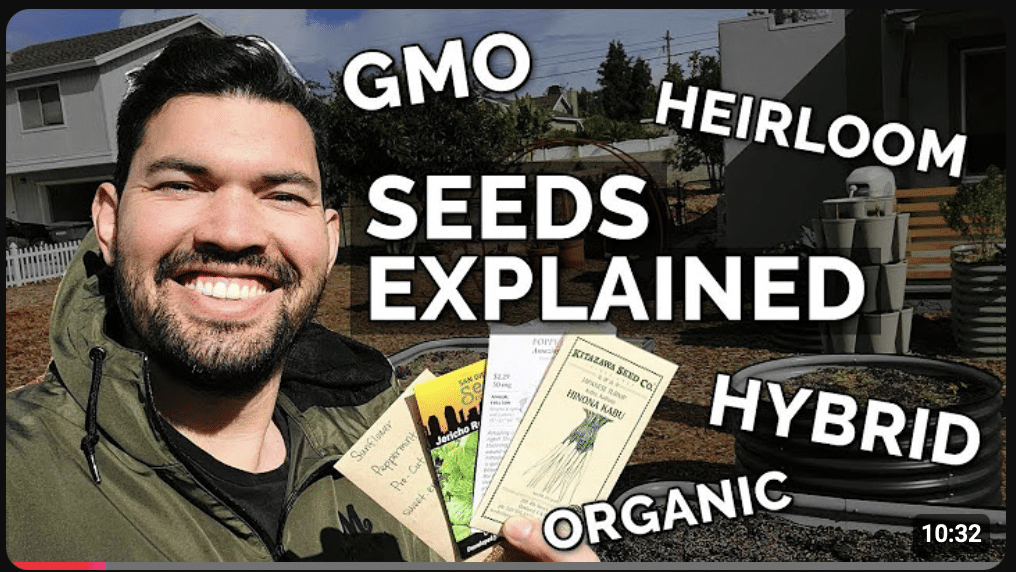Short Answer:
GMO seeds are developed through lab-based genetic engineering to add, remove, or enhance specific traits at the DNA level. Hybrid seeds are created by cross-pollinating two plants to produce offspring with targeted characteristics, mimicking natural processes.
Seeds Explained: Heirloom, Hybrid, Organic & GMO
Long Answer:
GMO Seeds:
Not all seeds are created equal. Some are carefully bred through traditional methods, while others are developed in high-tech laboratories—yet both are presented as solutions for feeding a growing global population. As worldwide food demand rises and climate change disrupts traditional farming, the need for crops that are more resilient and higher yielding has never been more urgent. Two prominent technologies (amongst many others) have emerged at the forefront of modern agriculture: genetically modified (GMO) seeds and hybrid seeds. Although they’re often confused or grouped together, these seed types are fundamentally different in how they’re created and used.
Genetically modified organisms (GMOs) are living organisms whose DNA has been deliberately altered in a laboratory. According to the USDA’s National Bioengineered Food Disclosure Standard, bioengineered foods are those that contain genetic material modified through specific lab techniques—changes that could not occur through traditional breeding or found in nature (USDA, 2022). This form of genetic engineering allows scientists to introduce, enhance, or remove certain traits within an organism’s genetic code.
While GMOs are most commonly associated with agriculture and food production, they are also used in other sectors—such as pharmaceutical manufacturing (e.g., human insulin) and brewing industries. Although it is often a topic of controversy, GMO technology plays a broad role in modern life.
One of the first GMO crops to reach the market was a type of summer squash engineered to resist plant viruses. While not widely cultivated today, it paved the way for more impactful GMO innovations. A key example is the Rainbow papaya, developed in the 1990s to combat the ringspot virus that had devastated papaya production in Hawaii. This GMO variety effectively saved the state’s papaya industry.
In the United States, only a handful of GMO crops are currently grown, including corn, soybeans, cotton, sugar beets, and canola. For a complete and updated list of bioengineered crops approved for commercial use, the USDA provides detailed resources here: https://www.ams.usda.gov/rules-regulations/be/bioengineered-foods-list.
Hybrid Seeds:
In contrast to GMOs, hybrid seeds are the result of cross-pollination—a natural process that can occur with or without human intervention. Hybridization happens when pollen from one plant fertilizes the flower of another related plant species. This exchange can be facilitated by wind, insects, or even humans using tools like paintbrushes to manually transfer pollen.
The purpose of hybridization is to combine desirable traits from two parent plants—such as improved flavor, appearance, disease resistance, or yield. While hybrid seeds are often associated with agricultural science, the process itself mimics what happens in nature.
However, hybrid seeds—especially first-generation ones—often don’t reliably pass on their traits to the next generation. Stabilizing a hybrid with consistent traits can take years of careful breeding. These seeds are typically labeled with “F” followed by a number (e.g., F1 for first generation, F8 for eighth). Common examples of hybrid plants include Meyer lemon trees, sweet corn, and stargazer lilies.
Hybrid seeds are widely available to home gardeners and commercial growers alike. In contrast, GMO seeds are tightly regulated and generally not sold in consumer-facing stores. Farmers wishing to grow GMO crops must go through rigorous regulatory procedures.
Great Basin Seed Options:
At Great Basin Seed, we offer a wide selection of seed varieties, including native, non-native, conventional, hybrid, and genetically modified options. Out of more than 300 products in our inventory, only one is a GMO—Roundup Ready 438RR Alfalfa. This particular variety is engineered to resist herbicides, allowing for better weed control, which can help preserve both yield and nutritional quality in hay production.
We also carry hybrid grains such as Triticale, a cross between rye and wheat. Triticale combines the drought tolerance and hardiness of rye with the disease resistance and nutritional quality of wheat, making it a strong performer in variable climates.
If you’d like more information about any of these seed types, give us a call at (435) 283-1411.
